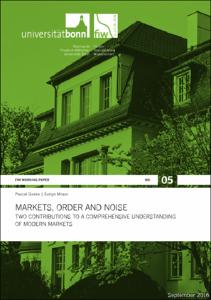Goeke, Pascal; Moser, Evelyn: Markets, order and noise : two contributions to a comprehensive understanding of modern markets. Bonn: Forum Internationale Wissenschaft, 2016. In: FIW Working Paper, 05.
Online-Ausgabe in bonndoc: https://hdl.handle.net/20.500.11811/1149
Online-Ausgabe in bonndoc: https://hdl.handle.net/20.500.11811/1149
@techreport{handle:20.500.11811/1149,
author = {{Pascal Goeke} and {Evelyn Moser}},
title = {Markets, order and noise : two contributions to a comprehensive understanding of modern markets},
publisher = {Forum Internationale Wissenschaft},
year = 2016,
month = sep,
series = {FIW Working Paper},
volume = 05,
note = {Markets are a central feature of modern society. As such, it comes as no surprise that they constitute a popular subject of research in (economic) sociology, where they are observed from various analytical perspectives and judged according to different normative positions. Yet, despite their apparent omnipresence, there seems to be no discernible consensus on how to grasp the market theoretically. As a consequence, existing analytical approaches to market phenomena shed light on important individual aspects, but overall their findings appear fragmented and incomplete. This applies in particular to modern markets, which are characterised by an immense degree of complexity and speed. Given this situation, this paper aims to push forward recent attempts in economic sociology to theorize the market by suggesting two contributions: In the first part of the paper, we take a closer look at four theoretical perspectives on markets, namely interaction, networks, institutions and performativity, investigating in detail their merits, mutual compatibilities and contradictions. The second part starts with the discussion of Weber’s and Aspers’ market definitions, which helps us to specify the missing piece in order to more comprehensively account for modern markets and their distinct properties. To fill this gap, we draw on some theoretical ideas of sociological systems theory that lead us to an understanding of markets as the tension between a particular form of order and a particular form of disorder or noise, which emerges if communications of exchange and observation of competitors focus on and become visible in the formation of prices.},
url = {https://hdl.handle.net/20.500.11811/1149}
}
author = {{Pascal Goeke} and {Evelyn Moser}},
title = {Markets, order and noise : two contributions to a comprehensive understanding of modern markets},
publisher = {Forum Internationale Wissenschaft},
year = 2016,
month = sep,
series = {FIW Working Paper},
volume = 05,
note = {Markets are a central feature of modern society. As such, it comes as no surprise that they constitute a popular subject of research in (economic) sociology, where they are observed from various analytical perspectives and judged according to different normative positions. Yet, despite their apparent omnipresence, there seems to be no discernible consensus on how to grasp the market theoretically. As a consequence, existing analytical approaches to market phenomena shed light on important individual aspects, but overall their findings appear fragmented and incomplete. This applies in particular to modern markets, which are characterised by an immense degree of complexity and speed. Given this situation, this paper aims to push forward recent attempts in economic sociology to theorize the market by suggesting two contributions: In the first part of the paper, we take a closer look at four theoretical perspectives on markets, namely interaction, networks, institutions and performativity, investigating in detail their merits, mutual compatibilities and contradictions. The second part starts with the discussion of Weber’s and Aspers’ market definitions, which helps us to specify the missing piece in order to more comprehensively account for modern markets and their distinct properties. To fill this gap, we draw on some theoretical ideas of sociological systems theory that lead us to an understanding of markets as the tension between a particular form of order and a particular form of disorder or noise, which emerges if communications of exchange and observation of competitors focus on and become visible in the formation of prices.},
url = {https://hdl.handle.net/20.500.11811/1149}
}






